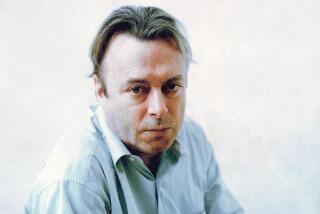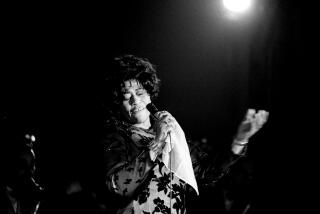Fragments of Friendship : THE...
- Share via
All these years later, only fragments are left to discover: the pocket lint, the letters and cables and scrawls of handwriting on hotel letterheads. Ernest Hemingway has been gone 35 years. F. Scott Fitzgerald would have been 100 last year. Their editor, Maxwell Perkins, died in New York on June 17, 1947. We can be pretty sure none of them would have deemed this new batch of Lost Generation books worth publishing, and in Hemingway’s case, he expressly instructed that his letters not be. But these men strove for greatness, and they achieved it at a propitious time in the history of American literature. By dint of their genius, these writers propel themselves across the generations, by the artistry of their work, by the style with which they lived and by their celebration of imagination.
So crack open those musty steamer trunks. Here is a moody Hemingway, glorying in life, fighting back his doubts, nagging about money and trying to yank the stuffing out of America’s shirt to see his unprintable profanities in print. “I am not the little boy writing them on the wall to be smart.” And Fitzgerald, shaky and high-strung, is scrambling for money, too, and grasping always to hold onto his talent. And here’s old Perkins, the scout master, encouraging his temperamental boys and trying to keep them from self-destruction and along the way revealing the quiet grace of his legend.
Of most consequence in this revival is the Hemingway-Perkins correspondence, 130 letters from Hemingway and 108 from Perkins, actually only a fraction of those in existence. Just more than one-third of these Hemingway letters were published in 1981 in Carlos Baker’s “Ernest Hemingway: Selected Letters” (Scribner). But this new volume is entirely different in intent and effect. It is a history of the craft of writing as told by two old bulls of American literature. And that means the banal as well as the wondrous.
And while this correspondence is about writing that lasts, it does not stand as notable writing itself. Hemingway was a free-spirited, slap-dash letter writer, unlike, say, John Steinbeck, who wrote letters as a warm-up and with great care for his prose. Put your thoughts down in hot blood, Hemingway used to say, and correct them when your temper has cooled. Whether it was an interview, a news dispatch or an entire novel, he insisted upon a second and third chance to make his words come out right. He did not do the same with his letters.
The result is a comparative lesson in just how much labor Hemingway had to devote to writing when it was meant for the public. They did not just flow from his pencil, those lyrical, suggestive sentences with beauty that was imperfect but unforgettable. They were drawn on an anvil, hammered and polished, a much different result than downing a few cocktails and grabbing a sheet of paper to hector his editor about the design of a book jacket.
Still, there is plenty of Hemingway in Hemingway’s letters, including aphorisms that came to represent, as it were, his philosophy of writing. Such as this, from 1926: “When you tell so much of the truth you can’t afford to have anything not true because it spoils the taste.”
Despair is common to artists without regard to fame or success, and Hemingway’s is more vividly drawn here than anywhere else. In 1929, this:
“I always figured that if I could write good books they would always sell a certain amount if they were good and some day I could live on what they would bring in honestly--but Scott tells me that is all bunk--that a book only sells for a short time and that afterward it never sells and that it doesn’t pay the publishers even to bother with it. So I guess it’s all just a damned racket like all the rest of it and the way I feel tonight is to hell with all of it.”
Perkins’ side of the correspondence shows a mentor of patience and deference, always keen, and rigidly faithful to the integrity of the writer. Not once, even through the Great Depression, does Perkins even make a vague suggestion about commercialism--a show of restraint unimaginably quaint today.
”. . . The utterly real thing in writing is the only thing that counts,” he wrote in 1935.
The difficulty with this correspondence is the tedium that one must plow through: These letters contain long--emphasize long--discussions of money, of advances on work, royalties, serializations, advertising and the sequential order in which stories should be published in collections. Surely, only scholars and fanatics will care as writer and editor reconcile $6,500 in outstanding advances with February 1931’s royalty report of $2,192.59 due Hemingway.
The editor of this book and the Fitzgerald centenary volume, Matthew J. Bruccoli, is a professor of English at the University of South Carolina. He is best known for his Fitzgerald scholarship and biography, “F. Scott Fitzgerald: A Life in Letters.”
“On Authorship” is published on the occasion of what would have been Fitzgerald’s 100th birthday (he died in 1940). It seeks to correct the impression that Fitzgerald’s tragedy overshadowed his talent. His own works and letters and the words of critics are collected to give the writer’s legend a polishing, although always the question will hang in the air when he is mentioned: What might have been?
As he says himself in a magazine article reprinted here, “The history of my life is the history of the struggle between an overwhelming urge to write and a combination of circumstances bent on keeping me from it.”
One is tempted to conclude that these are minor books. But not entirely. Hemingway and Fitzgerald, coaxed along by Max Perkins, were good enough to last, and they stir deep passions all these years later.
More to Read
Sign up for our Book Club newsletter
Get the latest news, events and more from the Los Angeles Times Book Club, and help us get L.A. reading and talking.
You may occasionally receive promotional content from the Los Angeles Times.







